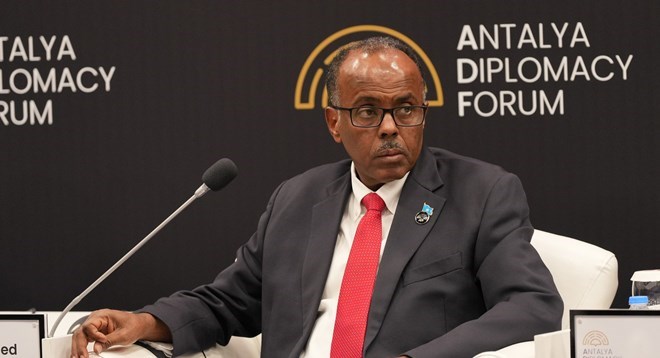
Friday April 11, 2025

Mogadishu (HOL) — Somalia's government says relations with Ethiopia are stable once again, months after a maritime deal between Addis Ababa and Somaliland triggered one of the worst diplomatic rows in years between the two Horn of Africa neighbours.
Speaking at the Antalya Diplomacy Forum in Turkey on Friday, Somalia's State Minister for Foreign Affairs Ali Mohamed Omar, widely known as Ali Balcad, said both sides are now working to restore cooperation. "We have a strong relationship with Ethiopia," Balcad said. "A stable Somalia benefits Ethiopia, and a stable Ethiopia benefits Somalia."
The remarks come more than a year after Ethiopia signed a controversial memorandum of understanding (MoU) with Somaliland on January 1, 2024, granting it access to a 19-kilometer coastline near Berbera for 50 years. The agreement also included language suggesting Ethiopia could recognize Somaliland as an independent state—something no UN member has done to date.
Under growing international pressure, Turkey brokered talks between Mogadishu and Addis Ababa, culminating in the Ankara Declaration on December 12. The agreement reaffirmed each country's respect for the other's sovereignty and laid the groundwork for future negotiations over Ethiopia's desire for maritime access—this time through formal channels involving Somalia.
Balcad's comments appear aimed at signalling a return to business as usual after Somalia publicly accused Ethiopia of violating its sovereignty earlier this year. In January, Ethiopia signed a memorandum of understanding with Somaliland — a breakaway region Somalia considers part of its territory — granting it naval access to the Red Sea in exchange for potential recognition.
The move drew sharp condemnation from Somalia's federal government and led to a temporary freeze in cooperation between the two countries, including military and diplomatic engagements.
The diplomatic standoff had raised serious concerns among Western allies, including the United States, who warned that instability between Ethiopia and Somalia could undermine ongoing counterterrorism operations in the region and embolden groups like al-Shabaab. Somalia and Ethiopia have historically coordinated security efforts, especially in southern Somalia, where Ethiopian troops play a key role.
However, as a sign of thawing relations, Somalia has cleared Ethiopia to contribute 2,500 troops to a new African Union-led peacekeeping force, AUSSOM, which is replacing the outgoing ATMIS mission.